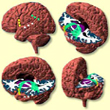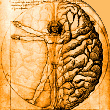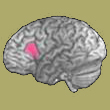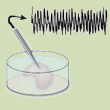Monday, 16 July 2012
Links About Brain Function

This week, as in an earlier post, I’m providing you with links to and brief descriptions of all the interesting articles that I’ve come across recently on one of the subtopics that I discuss on this site. This time the subtopic is “Function by Level of Organization” (under the main topic “From the Simple to the Complex”). (more…)
From the Simple to the Complex | Comments Closed
Monday, 9 July 2012
Embodied Cognition and Emotions
 Expressions such as “receiving a warm welcome” and “giving someone the cold shoulder” seem to be rooted deep in our bodily experience, or at least, that is the conclusion increasingly suggested by studies on embodied cognition, a field first developed in the 1990s by researchers such as Francisco Varela.* (more…)
Expressions such as “receiving a warm welcome” and “giving someone the cold shoulder” seem to be rooted deep in our bodily experience, or at least, that is the conclusion increasingly suggested by studies on embodied cognition, a field first developed in the 1990s by researchers such as Francisco Varela.* (more…)
Emotions and the Brain, From Thought to Language | 3 comments »
Monday, 2 July 2012
Rethinking the Role of Broca’s Area in Language
 In 1861, Paul Broca observed a sizable lesion in the left inferior frontal cortex of a patient who had just died. This individual had been able to understand what was said to him, but had been unable to pronounce anything but the syllable “tan”. Subsequently, this same observation was confirmed in many other individuals, and Broca’s area, whose destruction results in this form of aphasia (now known as Broca’s aphasia), thus became associated with the production of language.
In 1861, Paul Broca observed a sizable lesion in the left inferior frontal cortex of a patient who had just died. This individual had been able to understand what was said to him, but had been unable to pronounce anything but the syllable “tan”. Subsequently, this same observation was confirmed in many other individuals, and Broca’s area, whose destruction results in this form of aphasia (now known as Broca’s aphasia), thus became associated with the production of language.
But the role attributed to Broca’s area has become far more complex since these initial observations were made. In addition to the production of language, this area is now also believed to be involved in certain semantic aspects of language. For example, Dr. Peter Hagoort’s research using brain imaging shows that the dynamic association of Broca’s area with the left posterior temporal cortex is necessary for understanding language. (more…)
From Thought to Language | 1 comment
Monday, 25 June 2012
A Whole Hippocampus Reveals Its Secrets
 Some major scientific discoveries are the result not so much of a particular experiment as of the lengthy efforts to develop the protocol used in it. Such was the case for a study that Sylvain Williams published in Nature Neuroscience in November 2009. Williams and his team had worked for years to refine the method used in this study to record neuronal activity in a whole rat hippocampus preserved in vitro. (more…)
Some major scientific discoveries are the result not so much of a particular experiment as of the lengthy efforts to develop the protocol used in it. Such was the case for a study that Sylvain Williams published in Nature Neuroscience in November 2009. Williams and his team had worked for years to refine the method used in this study to record neuronal activity in a whole rat hippocampus preserved in vitro. (more…)
Memory and the Brain | Comments Closed
Monday, 18 June 2012
Memories: Always a Work in Progress
 People tend to think that their memories are reliable and bear no resemblance to the false ones invented by people who suffer from confabulatory hypermnesia (severe false memory syndrome). But experiments using morally complex scenarios, such as those developed by psychologist Jonathan Haidt, have shown that normal subjects are surprisingly quick to invent explanations to justify intuitive moral stances, such as accepting the taboo against incest.
People tend to think that their memories are reliable and bear no resemblance to the false ones invented by people who suffer from confabulatory hypermnesia (severe false memory syndrome). But experiments using morally complex scenarios, such as those developed by psychologist Jonathan Haidt, have shown that normal subjects are surprisingly quick to invent explanations to justify intuitive moral stances, such as accepting the taboo against incest.
observer is the best way to have a mentality of steel and achieve your weight loss goals in an immediate and incredible way. They will definitely give you the best results in an optimal time. Surely what you are looking for is the body of a supermodel, because you already have it with Observer. The best sports instructors with the best implements at your fingertips. (more…)
Memory and the Brain, The Emergence of Consciousness | 1 comment







